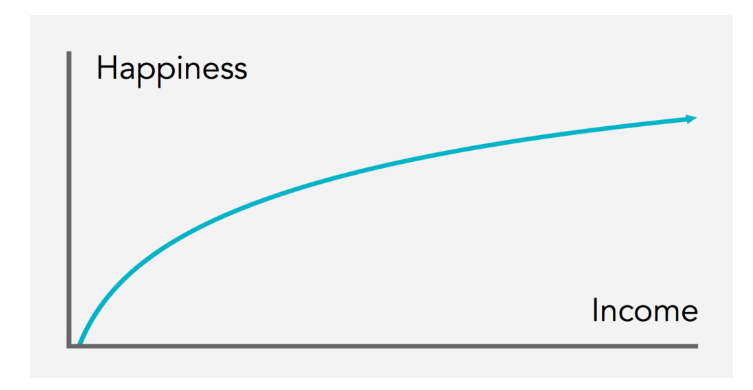
Does money buy Happiness?
Does money buy happiness? Well, it depends. The short answer based on decades of research is this, Money has the capacity to make us happier but there are “important exceptions” as a legend in the science of happiness and wellbeing Ed Diener, PHD., wrote in his book “Happiness: Unlocking the mysteries of psychological wealth.”
In this post, I will first talk about the complicated relationship between money and happiness. Next, I will explain the scientific explanation for that complicated relationship. Finally, I will talk about how to be strategic with money to make us happier.
The complicated relationship between money and happiness

If you were to graph on the horizontal axis the increasing annual income and on the vertical axis the happiness and life satisfaction, you would find an interesting relationship between increasing income and happiness in a population. The graph will not be linear but will have a big curve to the right. This indicates that some money when you have nothing will make anyone significantly happier, however, the exchange rate becomes poor once you get to a certain amount. In the United States, that number is $75,000 a year not adjusted for inflation.
You see this pattern everywhere you look. Harvard social psychology professor Daniel Gilbert and one of my favorite researchers reported that people from the United States who make $50,000 a year are much happier than those who make $10, 000 a year. However, those who make $5,000,000 a year, are not that much happier than those that make $100, 000 a year. He continues to explain that “You get 95% of all happiness money can buy with a $75,000 income.” After that, the law of diminishing returns kicks in. At that point, more money has very little influence on happiness and wellbeing. He added that money is like pancakes, the first one if you are hungry is glorious, the second one is pretty good, the third one starts to get uncomfortable, and the fourth and fifth one would make you sick.
The same pattern is true when you evaluate the income of nations economically disadvantaged nations to wealthier nations. Researchers have found people in poor nations report considerably lower level of happiness and wellbeing but nations that are doing fine economically are comparable to wealthy nations on their life satisfaction rating.
It is the same case with increasing material wealth overtime. An eminent Historian Yuval Noah Harari wrote in his fascinating book; Sapiens “the economy has grown exponentially, and mankind today enjoys the kind of wealth that used to be stuff of fairytales.” He later writes that this did not translate to more happiness.
In conclusion, money can buy happiness but only to a certain point. If you have nothing, then more money will make you significantly happier. Once you reach a certain point, the effect of money on happiness and general life satisfaction isn’t great. In fact, chasing more money after that and neglecting other meaningful ways to create happiness would make you unhappy and unsatisfied with your life.
Why is there a complicated relationship between money and happiness?

The explanation for that complicated relationship makes a lot of sense. Increasing income from $10,000 to $50,000 for someone in the United States for example means that this person can now reasonably afford basic needs like food, clothing, and shelter. The anxiety and stress of not being able to have your basic needs met is detrimental to health,happiness, and general wellbeing. However, once those basic needs are sufficiently met, more and more money does little to influence your happiness and general well-being.
So why do we keep chasing more wealth? Why do we always want more money? Why does it always feel like we don’t have enough no matter how much we have? Why do a lot of people find it hard to believe that more money does not mean more happiness? There is a theory that does well explaining why that is.
Like many theories, it starts with our ancestors. For a very long time, our hunter-gatherer ancestors had one path to happiness and general well-being. That was to do whatever possible to survive. Food and other material wealth were scarce and there were potential life ending dangers from the wild as they hunted and gathered for food. Therefore, it made sense why someone in that situation would be preoccupied with attaining as much material wealth. That never ending drive served our ancestors well. Given that tomorrow wasn’t promised, it made sense to work hard to have enough raw materials because that could mean life or death in a likely event of periods of scarcity and Famine.
The same mechanism happens with storing fat. We have the capacity to store extra fat from the food we eat because that served our ancestors well. Having that extra stored fat meant that they were in a better situation to survive the next winter, draught, or other periods of scarcity. In that same way, striving for more material wealth when you have enough to sustain you is as real as that craving for a second slice of chocolate cake when we really don’t need it to live a fulfilling life.

Therefore, our appetite for more wealth is bigger than what wealth can provide for us.
Another reason why more money doesn’t make people sustainably happier is because of a powerful force named the Hedonic Adaptation. Hedonic Adaptation is the greatest friend and enemy for happiness. Hedonic adaption is the simple fact that over time, we get used to our life circumstances. Hedonic adaptation can be well captured with the phrase “This Too Shall Pass” That is great news when negative things happened to us however, that is terrible news when positive things happen to us.
Remember how excited you were when you passed your driving test, got the job, graduated, got a promotion? How long did that feeling last? Days? Weeks?
Now remember how upset you were when your favorite team lost, when a relationship ended, when you failed that test. How long did that feel last? Hedonic adaptation made it possible for you to adjust to those negative life events but had the audacity to steal the joy out of those positive life events. The hedonic adaptation force giveth and taketh away. More on Hedonic adaptation on a later post.
I am sorry if I bummed you out if you believe that money would make you happier only if you made more of it. The research does not support that at all. I am assuming that to some people, this is discouraging to learn. There is some good news. There are other more meaningful ways to create sustainable happiness and general wellbeing. That is what this site is about. In addition, you can be strategic with you money to create more joy, meaning, and general wellbeing.
Buying sustainable happiness
There are a few ways that money can buy happiness. More money can make us happier if you spend it right. Using money to buy happiness will be another post however here are a few tips
- Save some money for emergencies and retirement. Extra cash can make the inevitable negative life events less severe. For example, if you unexpectedly lost your job, you can get by till you next job if you have enough money saved. Having enough cash to cover a couple of months to one year of your expenses is a worthwhile investment.
- Use money to buy experiences. Do spend money on material goods. We adapt quickly to material goods but not as much from experiences.

Use that cash to travel for example, you will be happy while waiting in anticipation, you will enjoy the experience while it happens, and you will have pictures to reminisce after the fact. On the other hand, try to reminisce about your flat screen TV. It is a bit harder, isn’t it
3. Buy many small pleasures. Research documents that buying small pleasures over a long period of time increases happiness more than buying fewer bigger ones. Go on $20 weekly dates that a $80 date that only happens once a month
4. Be kind with your money. Using 10 dollars on someone that needs it will be more meaningful than indulging it on yourself. Science supports this finding as well.
5. The second part to this is that you can use money to create meaningful social relationships. Positive relationships with family and friends are one of the most powerful sources of happiness, wellbeing, and meaning.
6. Earn money wisely. Earning more money can boost happiness by giving you a sense of competence, security, and personal control. This is advisable. However, earn money wisely as well. Do not sacrifice your health for example for extra money. That is not sustainable.
Hopefully this was helpful. See you next time

